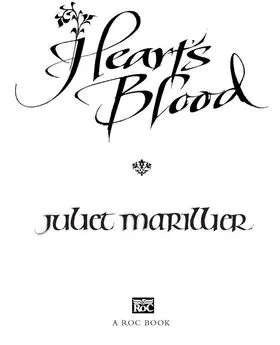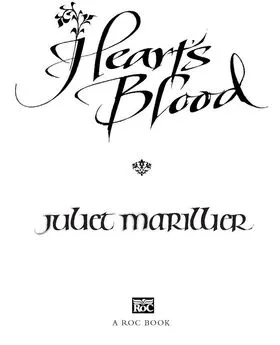Juliet Marillier - Wildwood Dancing
- Название:Wildwood Dancing
- Автор:
- Жанр:
- Издательство:неизвестно
- Год:неизвестен
- ISBN:нет данных
- Рейтинг:
- Избранное:Добавить в избранное
-
Отзывы:
-
Ваша оценка:
Juliet Marillier - Wildwood Dancing краткое содержание
Wildwood Dancing - читать онлайн бесплатно полную версию (весь текст целиком)
Интервал:
Закладка:
Paula put up a hand to dash tears from her cheeks. I started to shiver again and found I couldn’t stop. Costi put one arm around me and the other around my sister. He said, “Shall we go home now?”
That was not quite the end of our story. We put it about that Tati had gone on an extended trip to see distant relatives in the east. Later she would conveniently marry in those parts, too far away for easy visits. We told Aunt Bogdana the truth, and she accepted it with lifted brows and little comment. After all that had happened, she was, perhaps, beyond being shocked.
A few weeks after that eventful night, we had the most welcome of surprises. Father rode into the courtyard, much thinner but undoubtedly in good health. Gabriel was by his side, with two baggage ponies bringing up the rear. The letter brought to them by a certain preternaturally tall messenger had been the only one of mine to reach them. Father had received several from Cezar during the winter, assuring him that all was well with us. He was much relieved to find that this was 398
indeed so, and that everything was as it should be at Piscul Dracului. Almost everything.
Father went very quiet when we told him about Tati, and for a little I feared a relapse. But the fact that Costi was alive, and that he and I wished to marry, was a powerful force for healing. We reassured him that Tati would be well and happy, and that she was among good friends.
As for Costi and me, Father’s return home gave us a little longer to enjoy getting to know each other as girl and boy, rather than girl and frog, before we needed to organize a wedding and start work on producing the male heir required for Piscul Dracului. More time: more walks in the forest as spring slowly crept back to our valley, more campfires, more adventures. More kisses. We were getting better at those all the time. We talked a lot about the future, a future in which we would work together in the business and travel together to those exotic places I had dreamed of.
Aunt Bogdana invited Iulia up to Vârful cu Negur˘a to help with planning a betrothal party. R˘azvan and his sister would be invited. Paula and Stela worked on the papers Paula had brought home from the Other Kingdom. I had told them about the King of the Lake game, and how my taking back my little crown meant our portal would be closed to us from now on.
They were trying to find another crossing human folk could use. Paula was sure the secret was hidden somewhere in those documents.
I wished them luck. In my heart I knew that for me and for Costi, the visits to Dancing Glade were over. We had moved 399
on to a new adventure, one that belonged wholly in our own world, and the prospect of it was so joyful and so exciting that I had few regrets. Only Tati: my lovely sister, destined to fade from human memory and become a princess in a fairy tale, captured by a dark suitor from the realm beyond, sacrificing all for love. I hoped they were truly happy, she and Sorrow.
I did not think I would ever see my elder sister again. But Piscul Dracului was a place of unexpected corners, of eccentric ways and sudden surprises. In time, a new generation would play here, would climb the crooked stairways and run along the galleries and make daring forays out into the great mystery that was the wildwood. Perhaps a pair of children would one day stumble upon a secret portal, and open it by accident to find a wondrous world of magic beyond. They might see the glowing lights and hear the beguiling music of Ileana’s glade. And if they dared to cross over, perhaps they would dance with Tati’s children.
400
Author’s Note
Transylvania is a region rich in mythology and folklore, with a long and tumultuous history. Traveling there, I found that it lived up entirely to its reputation, with visible links to an ancient past as well as uglier remnants of more recent times. Villagers scythe hay in the shadow of crumbling Communist-era factories; horse-drawn carts traverse roads leading to clusters of concrete apartment buildings.
During my time there, I visited such well-known attrac-tions as the walled medieval city of Sighi¸soara, but also strayed off the beaten track to meet some of the extraordinary people of the Transylvanian villages. From the protective red tassels on the harness of draft horses to the many crucifixes by the way-
˘
side, from the delights of mamalig
˘ ˘a served with cream and fer-
mented cheese to the first toe-curling mouthful of home-brewed plum brandy, I had a rich and unforgettable taste of life on the Transylvanian plateau, surrounded by some of the grandest mountains and wildest forest in the world.
On hearing the name Transylvania, many people think of vampires and werewolves. Bram Stoker has a lot to answer for!
His novel Dracula, published in 1897, sparked readers’ imagina-tions. It gave rise to an elaborate vampire mythology, which became so popular over the years that many people came to believe it represented the authentic folklore of the region.
There is a whole “vampire tourism” industry in Romania, which encourages the (incorrect) belief that the fifteenth-century 401
prince Vlad ¸Tepe¸s was the original Count Dracula. Vlad inherited the right to use the name Dr˘aculea (son of Dracul) from his father, Vlad III, who was a member of the chivalric Order of the Dragon.
In Romanian, the word drac means both dragon and devil, and it is not difficult to see how this led to a devilish reputation for Vlad the son. He did carry out some cruel and barbaric acts during his time as prince of Wallachia, but he also led his people in a strong defense against the Turkish invaders. There is, however, no evidence at all that he was a vampire.
Stoker’s novel is a work of imaginative fiction. But his story does owe something to the original myths, legends, and beliefs of Transylvania. In Wildwood Dancing , I have tried to go back to earlier sources for my inspiration, and it is for this reason that Tadeusz and his followers are not referred to in the book as vampires, but by the more general name of Night People. I have deliberately made their portrayal ambivalent—are they all bad or partly good?—in order to avoid the Dracula stereotype.
Crucifixes stand all over the rural landscape of Transylvania. They are erected to deflect not only the powers of the devil in this mostly Romanian Orthodox region, but also other entities that may live in the forest—ancient forces that may threaten those who do not respect them.
This is a land where bears and wolves come close to human settlements, a place where snow can lie heavily for up to six months of the year. To survive in such a harsh environment requires a particular understanding of the balance between humankind and wild nature. Certain rituals in which animal masks 402
are worn take place in the more isolated villages at appropriate times of year. These may go back to the practices of the Transylvanians’ ancient ancestors, the tribe of the Dacians, among whom there were both shaman-healers and a warrior caste dedicated to the wolf.
As Paula explains in Wildwood Dancing , the forest provided a refuge for the people of the plateau through hundreds of years of unrest. This enabled Transylvania to retain some autonomy, and a strong sense of identity, despite the presence of such invaders as the Tartars, the Magyars, and the Turks.
403
Glossary
Bra¸sov
A merchant town in central
Transylvania. Pronounced Brah- shove
ciorb˘a
Traditional Romanian broth.
Pronounced chor -buh
Constan¸ta
A trading port on the Black Sea coast.
Pronounced Kahn- stahn -tsah
m˘am˘alig˘a
A porridge or cake made with cornmeal
(polenta), and often cooked with sheep
cheese. A staple of the Romanian diet.
Pronounced muh-muh- lee -guh
Piscul Dracului
Devil’s Peak. Pronounced Pis -kul
Drah -koo-looy
poman˘a
A feast for the dead, at which their
worldly goods are given away.
Attended by friends; relatives;
important folk from the village, such as
the judge, priest, and teacher; and poor
people. A spiritual value is attached to
the distribution of the departed one’s
possessions. Can be held at several
significant times after the death: e.g.,
seven days, seven months, one year, or
405
seven years afterward. Pronounced
poh- mah -nuh
Sibiu
A merchant town in central
Transylvania. Pronounced See- bee yoo
¸Tara Româneasc˘a
A region south of Transylvania, also
known as Wallachia. Pronounced Tsah -
rah Roh-muh- neeyes -kuh
T˘aul Ielelor
Lake of the Iele. Iele are female spirits who lure folk to their doom.
Pronounced Tah- ool Yeh -leh-lor
¸tuic˘a
Plum brandy. Pronounced tswee -kuh
Vârful cu Negur˘a
Storm Heights. Pronounced Vur -fool
koo Neh -goo-ruh
voivode
The head of a Transylvanian territory;
princeling. Pronounced voh-yeah- vode
406
Pronunciation Guide
to Character Names
Anastasia
Ah-nah- stah -see-yah
Anatolie
Ah-nah- toh -lyeeah
Bogdana
Bohg- dah -nah
Cezar
Cheh -zahr
Costi, Costin
Kohs -tee, Kohs- teen
Dr˘agu¸ta
Druh- goo -tsah
Florica
Flo- ree -kah
Gogu
Goh -goo
Grigori
Gree- goh -ree
Ileana
Eel-leh- ah -nah
Iulia
Yoo -lee-ah
Jena, Jenica
Jeh -nah, Jeh- nee- kah (J pronounced like g in mirage )
Marin
Mah- reen
Nicolae
Nee-koh- lie -eh ( lie rhymes with sky )
Paula
Pow -lah
Petru
Peh -troo
R˘azvan
Rahz- vahn
Salem bin Afazi
Sah -lem bin Ah- fah -zee
Sandu
Sahn -doo
Stela
Stel -ah
Tadeusz
Tah- deh -oosh (deh-oosh almost
one syllable)
Tati, Tatiana
Tah -tee, Tah-tee- ah -nah
Teodor
Teh-oh- dor
407
Turn the page for a special preview of the
upcoming companion novel to Wildwood Dancing : CYBELE’S
SECRET
Excerpt copyright © 2008 by Juliet Marillier.
Published by Alfred A. Knopf.
Chapter One
The deck tilted to port, and I tilted with it, grabbing at a rope to keep my balance. One day out from Constanţa, the wind had turned contrary and the waters of the Black Sea rose and fell under the Stea de Mare ’s belly like a testy horse trying to unseat its rider.
“You have excellent sea legs, Paula,” my father commented. He stood perfectly balanced, a veteran of more merchant voyages than he could count. This was my first.
The sail crackled in the wind. The crewmen, grim-jawed and narrow-eyed, were struggling to keep the one-master under control. When they glanced my way, their expressions were hostile.
“It unsettles them to have a woman on board,” my father said. “Ignore it. It’s superstitious nonsense. They know me, and you’re my daughter. If the captain doesn’t like it, he shouldn’t have accepted my silver.”
“It doesn’t bother me, Father,” I said through gritted teeth. Having good sea legs didn’t mean I relished the bobbing motion of the boat or the constant drenching in salt spray. Nor did I much care for the sense that if the Stea de Mare sank, these sailors would put the blame on me. “Is this going to delay us, Father?”
Читать дальшеИнтервал:
Закладка:






